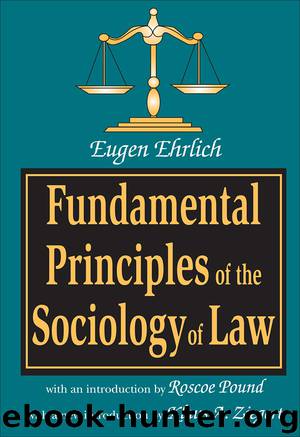Fundamental Principles of the Sociology of Law by Eugene Ehrlich & Klaus A. Ziegert

Author:Eugene Ehrlich & Klaus A. Ziegert
Language: eng
Format: epub
Publisher: Taylor & Francis (CAM)
Published: 2017-03-02T16:00:00+00:00
XII Juristic Science in England
IN THE last analysis it is an extraordinary piece of good luck for the sociology of law that from the early Middle Ages the English jurists (more Roman than the Romanists, says Maitland) steadfastly closed their minds to the Roman law. To this fact must be attributed the other fact that among the nations of European civilization, in addition to the Roman or Continental common law, another legal system, the Anglo-American, has attained a high and altogether independent development. If it is the function of all scientific study to demonstrate the unifying regularity of the phenomena, sociology could never fulfil this task if no other legal system besides that of the Roman law and that of its offspring, the Continental common law, had attained to a more advanced stage of development. For the other legal systems of the globe, which have remained uninfluenced by Roman law, have continued in so undeveloped a condition that they cannot be adduced for purposes of comparison except with earlier stages of our law. A comparison of the whole course of development of Roman and English law is outside of the scope of the present inquiry, which is limited to a study of legal science in England with continual reference to that of Rome and of the Continent. It is impossible to appraise legal science in England justly without a fleeting glance at the development of English procedure.
The oldest English procedure does not differ from the original procedure of the other Germanic peoples. We may assume therefore that it coincides in its essential features with the prehistoric procedure of Roman law. This view, which perhaps appears strange to many, is based on the fact that all those things in Roman procedure in historical times that appear to be striking peculiarities, the two stages, a preliminary proceeding followed by the Beweisverfahren (the proceeding in which proof is made) and the division effected by the litis contestation manifestly are survivals from, an earlier stage of the development of procedure, and, unless indications are deceiving, are found in essentials among all Germanic peoples. The formula of the later Roman procedure is none other in form and content than the conditional Beweisurteil ,1 which is followed among the Romans as well as among the Germans by the Beweisverfahren.2 Since there is absolutely reliable evidence that the two-fold division of the trial existed in the procedure by legis actio also, inasmuch as the litis contes tatio in this form of procedure effects a division just as it does in the formulary procedure, there is no doubt that in the litis contes tatio of the legis actio procedure an alternative Beweisurteil was rendered which, though perhaps it was not drawn up in writing, was very similar to the formula both in form and in content.
The actual development of English law and English procedure begins with Henry II, in the twelfth century. This king was perhaps one of the greatest juristic geniuses that ever sat on a throne,
Download
This site does not store any files on its server. We only index and link to content provided by other sites. Please contact the content providers to delete copyright contents if any and email us, we'll remove relevant links or contents immediately.
| Comparative | Conflict of Laws |
| Customary | Gender & the Law |
| Judicial System | Jurisprudence |
| Natural Law | Non-US Legal Systems |
| Science & Technology |
American Kingpin by Nick Bilton(3876)
Future Crimes by Marc Goodman(3592)
The Meaning of the Library by unknow(2565)
Inside the Middle East by Avi Melamed(2352)
Why Nations Fail: The Origins of Power, Prosperity, and Poverty by Daron Acemoglu & James Robinson(2288)
On Tyranny by Timothy Snyder(2227)
Living Silence in Burma by Christina Fink(2068)
Putin's Labyrinth(2016)
The Mastermind by Evan Ratliff(1933)
The Smartest Kids in the World by Amanda Ripley(1854)
Think Like a Rocket Scientist by Ozan Varol(1815)
Law: A Very Short Introduction by Raymond Wacks(1738)
It's Our Turn to Eat by Michela Wrong(1728)
The Rule of Law by Bingham Tom(1690)
Philosophy of law a very short introduction by Raymond Wacks(1666)
Leadership by Doris Kearns Goodwin(1632)
A Dirty War by Anna Politkovskaya(1627)
Information and Communications Security by Jianying Zhou & Xiapu Luo & Qingni Shen & Zhen Xu(1616)
Civil Procedure (Aspen Casebooks) by Stephen C. Yeazell(1554)
